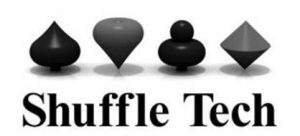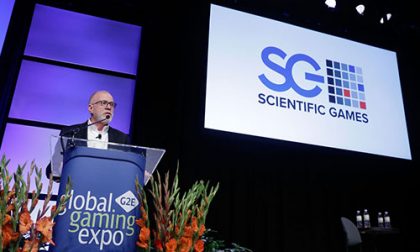Jury Returns $315 Million Judgment Against Scientific Games in Antitrust Suit
On Tuesday, a jury awarded a trio of companies $105 million in their antitrust lawsuit against Las Vegas-based gaming devices company Scientific Games. The verdict and award were significant in and of themselves, but it got even worse for Scientific Games, as the damages were tripled because of stipulations in U.S. law.
 The origins of the legal conflict date back several years. Shuffle Tech International LLC, as its name implies, is a company that makes automatic card shufflers. At the beginning of this decade, it developed a single-deck shuffler for casinos and had the design certified in March 2012. It then entered into a patent licensing agreement with Poydras-Talrick Holdings, who in turn sublicensed the technology to DigiDeal Corporation in September 2012.
The origins of the legal conflict date back several years. Shuffle Tech International LLC, as its name implies, is a company that makes automatic card shufflers. At the beginning of this decade, it developed a single-deck shuffler for casinos and had the design certified in March 2012. It then entered into a patent licensing agreement with Poydras-Talrick Holdings, who in turn sublicensed the technology to DigiDeal Corporation in September 2012.
DigiDeal then went about producing a line of casino shufflers using the Shuffle Tech technology. Its product, DigiShuffle, was priced lower than the device offered by the market leader, Shuffle Master, and billed as more reliable.
A week and a half after DigiDeal showed off the shuffler for the first time, Shuffle Master sued for patent infringement.
In early 2014, DigiDeal had Shuffle Master’s patents looked at again and found that Shuffle Master basically hid art that Shuffle Tech and DigiDeal may have otherwise noticed and thus been able to avoid patent infringement issues. So, Shuffle Tech, Poydras-Talrick, and Aces Up Gaming, a company that worked with DigiDeal, filed a counter-suit against Scientific Games in 2015 (Scientific Games bought Bally Technologies in 2013, which had previously acquired SHFL Entertainment (Shuffle Master) the previous year).
Scientific Games filed a motion to dismiss the six counts in the lawsuit and in October 2015, a judge did dismiss five of the counts.
Judge Matthew F. Kennelly summarized the main issue of contention that the three companies had with Shuffle Master in his Opinion:
Specifically, Shuffle Tech alleges that SHFL’s records referred to three crucial pieces of undisclosed prior art. First, the records indicated that at the time it prosecuted its patents in 2002 and 2003, SHFL was aware of, but failed to disclose to examiners, prototypes developed in 1995–1997 by Casino Concepts, Inc. known as “the Roblejo Prototypes.” The Roblejo Prototypes anticipated every claim of both the ‘982 and ‘935 patents. Second, SHFL’s records indicated that at the time it prosecuted its patents, it was aware of, but failed to disclose to examiners, the “Luciano Automatic Card Shuffler Prototype,” which anticipated claim 1 of the ‘935 patent and rendered obvious all of the other claims asserted against DigiDeal under the ‘982 and ‘935 patents. Third, SHFL’s records indicated that at the time it prosecuted its patents, it was aware that U.S. patent 6,361,044 (“the Block ‘044 patent”) fully described an automatic card shuffler in its detailed description, anticipating and rendering obvious all claims under the ‘982 and ‘935 patents. SHFL did not disclose the Block ‘044 patent when prosecuting the ‘982 patent, and although it did identify the Block ‘044 patent in its ‘935 application, it buried this identification among irrelevant prior art that the examiner was unlikely to read carefully.
He added, “Based on these allegations, plaintiffs contend that SHFL filed suit against DigiDeal with full knowledge that its patents were invalid and unenforceable, for no other reason than to litigate DigiDeal and its partners—the plaintiffs in this case—out of the casino shuffler market.”
The plaintiffs also claimed that Shuffle Master had a history of bullshit litigation to drive competitors out of the market.
As mentioned, the judge dismissed most of the claims, but allowed one to move forward:
Plaintiffs have sufficiently shown that they “intended to enter” the casino shuffler market “and [were] prepared to do so within a reasonable time.” Id. Because they have sufficiently pleaded facts alleging antitrust injury and supporting antitrust standing, plaintiffs may bring a section 2 claim for damages and injunctive relief pursuant to sections 4 and 16 of the Clayton Act, respectively. The Court declines to dismiss Count 2.
And so the case moved forward and we arrive at the past week, when a jury awarded $105 million to the three plaintiffs, a sum which was then tripled to $315 million.
In a response, Scientific Games spokeswoman Susan Cartwright issued a statement, saying, “The company believes the jury reached the wrong result and will seek review of both the finding of liability and the damages award both before the trial court and if necessary on appeal.”
“We’re quite happy, but it’s so fresh, we’re not sure what the next steps are,” Shuffle Tech CEO Rick Schultz told Howard Stutz of CDC Gaming Reports.
It isn’t a completely happy ending, though. Schultz said that the legal fees killed his company’s ability to invest further in the development of the casino shuffler. DigiDeal stopped making it as well. Shuffle Tech sold the technology to another company and only makes shufflers for the consumer market now.



















COMMENTS